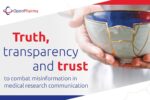This week, we explore the results of an analysis of open data adoption by Taylor & Francis and share news of Crossref’s launch of a new open research metadata dashboard. We ask if identity checks could help quash publication fraud and consider why public trust in science isn’t yet at an all-time high despite increased open access. We also explore recent research on how people around the world encounter and engage with scientific information, share an open letter from ODECO, and consider who truly benefits from open access publishing. Finally, we signpost an upcoming webinar about creating interoperable science infrastructures.
To read:
Taylor & Francis and DataSeer track open data adoption via Taylor & Francis | 7-minute read
Taylor & Francis and DataSeer have analysed over 8000 articles to assess adoption of open research practices. Key findings include: 52% of articles featured data availability statements; 18% produced new code or software, with 8% of those authors sharing it despite a lack of mandates; 8% had posted preprints; and Open Researcher and Contributor iDs (ORCID) uptake among authors is nearing universal adoption. The findings suggest authors – at least those publishing with Taylor & Francis – are embracing open research.
Crossref launches dashboard to elevate open research metadata coverage via EurekAlert! | 3-minute read
Open infrastructure provider Crossref has unveiled an enhanced dashboard to monitor completeness of open research metadata across its 175 million records. The tool enables publishers, funders and universities to identify metadata gaps – such as references, ORCID iDs, abstracts, licensing, funder information and more – and offers actionable feedback to help enrich records. Lena Stoll (Program Lead at Crossref) explains the move will “ … build towards the vision of an open and more complete Research Nexus”.
Are identity checks the answer to fake authors? via Nature | 12-minute read
Could trusted identity checks help quash publication fraud? In this article, Miryam Naddaf (Science Reporter for Nature Portfolio) investigates how paper mills are fabricating authors and reviewers to infiltrate journals and publish fraudulent research. The investigation comes after one network of 26 fake personas was used to publish 55 papers in Springer Nature journals. While publishers are tightening checks by using ORCID iDs, institutional credentials and even identity documents, there is concern that these measures risk excluding under-resourced researchers from scholarly publishing.
Why isn’t public trust in science at an all-time high? via The Scholarly Kitchen | 8-minute read
“If more research is openly available than ever before, and open is framed as a way to build trust, why isn’t public trust in science at an all-time high?”, asks Meagan Phelan (Communications Director, Science Family Journals at Science Magazine) in this article for The Scholarly Kitchen. Through an exploration of case studies from Science – including an unconventional joint press briefing for apparently contradictory papers – Meagan argues that open access alone doesn’t build trust; transparency does. Meagan concludes by presenting five recommendations for publishers and communicators to improve trust in research communications.
How people encounter and engage with science information via Science Communication | 45-minute read
This pioneering survey of 71 922 respondents across 68 countries examines how people encounter information about science and communicate about it with others. The authors conclude that social media is the most common source of science news in most countries, though traditional outlets such as newspapers remain important in some regions. Outspokenness and engagement vary by educational level and cultural context; less educated and non-collectivist societies are generally more outspoken. The authors also explore if limits to freedom of speech affect the willingness to speak up about science-related issues.
Building equitable open data ecosystems: an open letter via European Commission | 40-minute read
Authored by Ramya Chandrasekhar (Researcher at the French National Centre for Scientific Research [CNRS]) and Melanie Dulong de Rosnay (Research Professor at CNRS), this open letter from the Open Data ECOsystem (ODECO) consortium reviews challenges to sustainable open data, ranging from inconsistent standards and infrastructure gaps to unequal access and limited data skills. Drawing on interdisciplinary research, the authors argue that open data must serve not just economic but also social and ecological objectives. They propose nine actionable recommendations for enhancing data quality, governance, participation and infrastructure to help practitioners and policymakers build equitable, resilient and value-driven open data ecosystems.
Who benefits from open access publishing? via LSE Blogs | 6-minute read
In this review of Samuel Moore’s (Scholarly Communication Specialist at Cambridge University Library) Publishing beyond the market, Thomas Graves (Open Research Library Assistant at The London School of Economics and Political Science [LSE]) encourages readers to rethink who benefits from open access and who should shape its future. Moore highlights the unsustainable cost of article processing charges – sometimes over £9000 – and the market control of six major commercial publishers, and he advocates for a commons-based model of scholar-led, diamond open access journals that are free for authors and readers.
To engage with:
How to create interoperable open science infrastructures via Copim
Join Rosalie Lack (Coordinator of The Global Sustainability Coalition for Open Science Services [SCOSS]), Hannah Hillen (Metadata and Publisher Outreach Specialist at Thoth Open Metadata) and Tobias Steiner (Chief Operating Officer at Thoth Open Metadata), and Graham Stone (Head of International Projects at OAPEN) on Tuesday 11 November to explore how open infrastructures can collaborate beyond technical integration. This free webinar hosted by Copim, SPARC Europe and SCOSS will examine the social and strategic work needed to make open access infrastructures truly interoperable.
Enjoy our content? Read last week’s digest and check out our latest quarterly update!
Don’t forget to follow us on Bluesky and LinkedIn for regular updates!


![[[A close-up view of a traditional printing press in operation, showing metal type and inked rollers in motion as printed material is prepared.]]](https://www.openpharma.blog/wp-content/uploads/2025/12/16Dec25-150x100.jpg)



